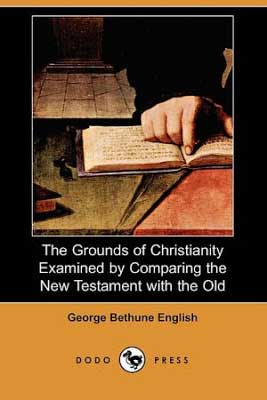
George Bethune English (1787?-1828), wrote a book pointing out that if the Old Testament were true, CHRISTIANS WERE DISTORTING the divine revelation. It was titled, The Grounds of Christianity Examined (Boston, 1813) and it can be read free online today. Whatʼs interesting is that George Bethune English graduated from Harvard in 1807, received the highest academic award, the Bowdoin Prize for his dissertation, and was awarded a Masters in theology in 1811.
During his theological studies at Harvard he began to doubt the truth of the Christian religion which he critiqued in a book titled, The Grounds of Christianity Examined (Boston, 1813), a book that drew a great deal of attention at the time. One reader commented that his work would ‘pass like wild-fire through the country,’ On November 4, 1814, the Church of Christ in Cambridge excommunicated him for this work. But what would make a nineteenth-century Harvard Divinity School graduate turn his back on his deeply held religious beliefs and write an incisive attack on Christianity? Apparently it was an obscure sixteenth-century polemic called the Chizzuk Emunah, written by a scholar from an obscure Jewish group. Formerly a Congregationalist minister, George Bethune English had rejected challenges to his faith until he discovered Rabbi Isaac ben Abraham of Trokiʼs book.
Aware of the hostile response that he could expect from devoutly Christian Americans, English not only argued his case against Christianity, but also his right to argue his case
A quotation from the preface to The Grounds of Christianity Examined (Boston, 1813):
It is remarkable, that the ablest modern advocates for the truth and divine authority of the gospel, as if they knew of no certain, demonstrative proof which could be adduced in a case of so much importance, seem to content themselves, and expect their readers should be satisfied, with an accumulation of probable arguments in its favour; and it has been even said, that the case admits of no other kind of proof. If it be so, the author requests all so persuaded to consider, for a moment, whether it could be reconciled to any ideas of wisdom in an earthly potentate, if he should send an ambassador to a foreign state to mediate a negotiation of the greatest importance, without furnishing him with certain, indubitable credentials of the truth and authenticity of his mission? And to consider further, whether it be just or seemly, to attribute to the Omniscient, Omnipotent Deity, a degree of weakness and folly, which was never yet imputed to any of his creatures ? for unless men are hardy enough to pass so gross an affront upon the tremendous Majesty of Heaven, the improbability that God should delegate the Mediator of a most important covenant to be proposed to all mankind, without enabling him to give them clear and, in reason, indisputable proof of the divine authority of his mission, must ever infinitely outweigh the aggregate sum of all the probabilities which can be accumulated in the opposite scale of the balance. And to conclude, I presume it will not be denied, that the authenticity and celestial origin of any thing pretending to be a Divine Revelation, before it has any claims upon our faith, ought to be made clear beyond all reasonable doubt; otherwise, it can have no just claims to a right to influence our conduct.


